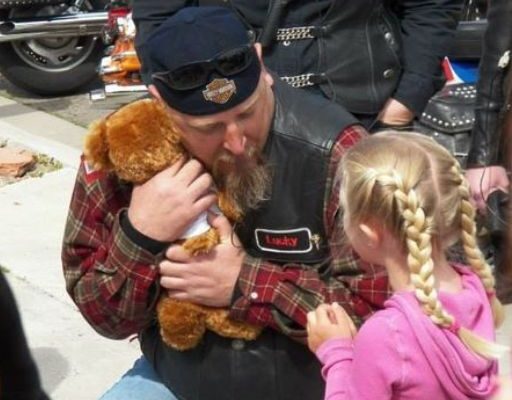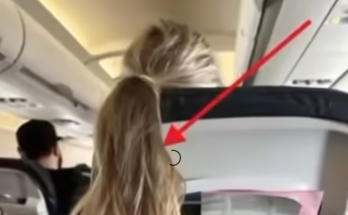His name patch said “Lucky,” but the man sitting on the curb didn’t look like he’d had any luck in a long time. We were at a biker charity event — the kind with roaring engines, clouds of exhaust, and laughter loud enough to shake your ribs. My sister had dragged me there, promising good food and “a little adventure.” I expected noise and chaos. What I didn’t expect was to watch a child change a man’s life.
My niece, Riley, was only seven at the time — a tiny girl in a pink hoodie and glittery sandals. She clutched her favorite teddy bear like it was treasure. When I asked why she’d brought it, she said, “I want to give it to someone who looks sad but strong.”
Then she spotted him.
Lucky sat alone on the edge of the lot, head down, sunglasses hiding his eyes. His beard was braided, his leather vest covered in patches, and his entire presence said, Don’t bother me. But Riley didn’t hesitate. She walked straight over to him, small and certain.
“You look like you need a hug,” she told him softly. “But my teddy’s better at those than me.”
The crowd’s noise seemed to fade. The man didn’t move at first, then slowly reached out and took the bear like it was something fragile. He stared at it for a long time before pressing it to his chest. His shoulders began to shake. Then the tears came — quiet, careful ones that he tried to hide behind his sunglasses until he couldn’t anymore. He took them off and wiped his face with the edge of his vest.
He asked Riley’s name, said the bear reminded him of his daughter, and gave her a soft fist bump before whispering something I couldn’t catch. Then he turned away, clutching the bear tightly.
A woman nearby — Joanie, one of the riders — pulled me aside and explained why he’d broken down.
Lucky wasn’t his real name. His name was Marcus. He’d earned the nickname from the clover patch stitched onto his vest — a black-and-white design surrounded by flames. But “Lucky” couldn’t have been further from the truth.
Joanie told me that Marcus had been through hell. His wife had left him after years of addiction struggles. He’d tried to stay sober for his daughter, Daisy, but life kept knocking him down. Six months earlier, Daisy had been killed by a drunk driver. She was eight years old.
“She loved teddy bears,” Joanie said quietly. “Carried one everywhere. Didn’t care if people teased her.”
That explained everything. Riley didn’t know his story — she just followed her instinct. But somehow, she had handed him the one thing that connected him to the daughter he lost.
For the rest of the day, Marcus stayed close to our group. He didn’t talk much, but he kept the bear in his hands the whole time. Every so often, he’d glance over at Riley, and she’d wave shyly. He’d smile back, small but real — like he couldn’t believe she was real either.
When the sun dipped low and people started packing up, Marcus approached us. He looked lighter, somehow. Not fixed, not healed, but human again. He knelt in front of Riley and handed her something wrapped in a handkerchief.
“For you,” he said, voice gravelly. “Something to remember me by.”
Riley unwrapped it — a small silver clover charm on a thin chain. “It’s beautiful,” she whispered.
He smiled. “It’s lucky. Just like you.”
Then he stood, gave a final nod, and disappeared into the crowd of engines and leather. We never saw him again that day.
Months passed. Life went on. Riley wore that charm everywhere — to school, to bed, even in the bath until we made her take it off. She’d ask sometimes, “Do you think Lucky misses his daughter?” I never knew how to answer.
Then one morning, a letter arrived. No return address — just a postmark from a nearby town. Inside was a note and a photograph.
The photo showed a little girl with bright eyes and curls, hugging a teddy bear almost as big as she was. Riley held it for a long time before whispering, “She looks happy.”
Years passed. Riley grew up, finished school, and studied counseling. She said she wanted to help people the way Lucky helped her see what kindness could do. When she opened her practice years later — focusing on grief and trauma — she kept a small teddy bear on her desk as a reminder.
“Sometimes,” she tells her clients now, “the smallest act of kindness can change a life. You never know who needs it.”
As for Marcus, word trickled through Joanie and other riders over the years. He stayed clean, rebuilt his life, and opened a support center for families dealing with loss and addiction. Its logo? A clover surrounded by flames.
Every time I think back to that charity event — the noise, the smell of exhaust, the sea of leather jackets — I realize none of us could’ve planned what happened. A broken man found peace. A child found her purpose. And all it took was a teddy bear offered with pure, unthinking kindness.
Life has a strange balance. Sometimes what looks like coincidence is really connection. Marcus found healing. Riley found her calling. And I learned that compassion doesn’t need to be grand or rehearsed — it just needs to be real.
So, if you ever see someone who looks like they’re carrying the world on their shoulders, don’t assume they don’t need you. Offer a smile, a kind word, or even a small gesture. You might just hand them the one thing that helps them start over.
Because sometimes, the simplest things — a stuffed bear, a child’s heart, or a stranger’s kindness — are what save us in the end.


